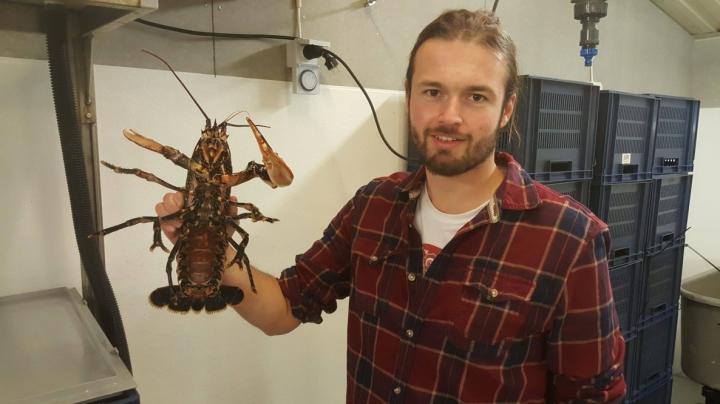
Credit: Linda Svanberg
Aquaculture in Sweden could be more sustainable if by-products from industrial feed production were used instead of wild-caught aquafeed. This is according to studies at the University of Gothenburg.
One of the most important challenges in aquaculture is access to fishmeal. Demand outweighs supply today due to the rapid expansion of aquaculture.
A new thesis has studied farming of the two species Atlantic wolffish and European lobster.
“These two species are popular among consumers and have a high market value in Sweden. The goal of the studies was to contribute to a knowledge base for the farming biology of these species with the welfare of the animals, a circular economy model and minimal environmental impact in mind, in accordance with the UN’s 2030 Agenda,” says thesis author James Hinchcliffe.
Increase the protein value
Studies from the thesis show that it is possible to produce high-value feed protein from unused by-products. For example, the meat left on the bones after fish fillets have been removed is not used today.
“With a new process, we can use fish meat to give fishmeal a higher protein content. By using feed containing by-products from the seafood industry to a greater extent in general, use of wild-caught aquafeed, like anchovies, can be reduced.”
Developed special feed for lobster larvae
Through laboratory experiments, James Hinchcliffe and his fellow researchers have also developed a species-specific feed to meet the need for suitable nutrients for lobster larvae.
“One of the greatest challenges of farming lobster is improving survival in the larval stages. That’s why we’ve developed a knowledge base about the most beneficial feed composition for the early life stages.”
Lobster larvae grow and survive best when they can eat related species, which is why a lot of cannibalism is seen in today’s lobster farming industry.
The studies investigated around ten different kinds of feed with local ingredients.
“We found that a diet with a percentage of shrimp, which came from local by-products from the industry, was the best source and most promising candidate for sustainable lobster feed.”
Atlantic wolffish good for farming
The studies also investigated the nutritional needs of Atlantic wolffish.
“The share of protein needed in the feed for optimum growth turned out to be relatively high – at least half the content of the feed.”
Collectively, the studies show that Atlantic wolffish seem to be a good species to farm. The fish are relatively easy to manage and resistant to stress.
“My hope is that the results of the studies will contribute information and can be used for environmentally sustainable aquaculture and production of nutritious food in Sweden,” says James Hinchcliffe.
###
Dissertation title: A circular economy approach for sustainable feed in Swedish aquaculture
Link: https:/
Media Contact
James Hinchcliffe
[email protected]
46-072-318-4333
Original Source
https:/




